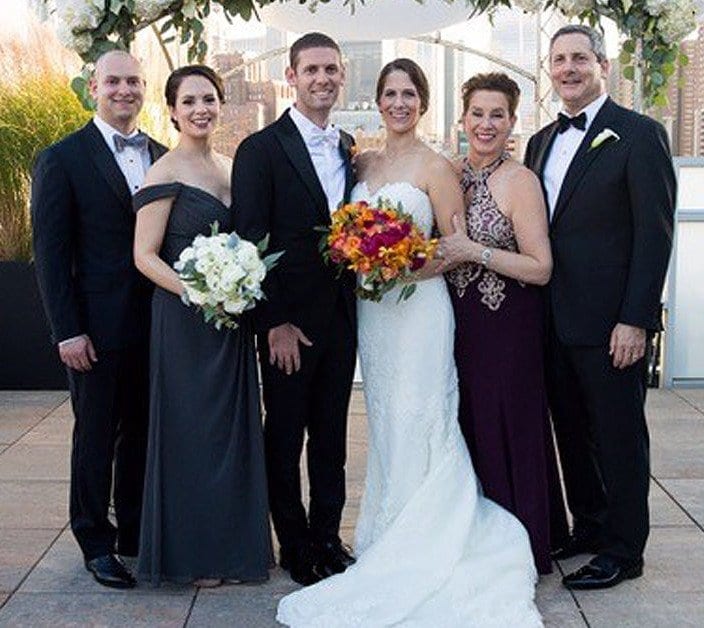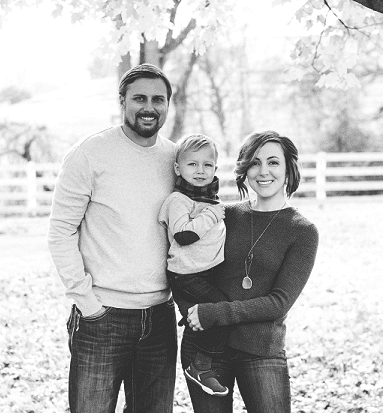Holiday Greetings in the Season of Giving

Dear friends,
Happy Holidays! If your family is like mine, these last weeks of 2018 are some of the busiest of the year. Our days become a whirlwind of holiday plans, travel arrangements, hosting family and friends and wrapping up any loose ends at work before the new year starts. Add a beautifully energetic 2 1/2-year-old in the mix, and there just aren’t enough hours in the day.
What keeps us going? At the Melanoma Research Foundation (MRF), it is OUR community. A few months ago, the MRF team met to reflect on the brave melanoma warriors we know. We talked about individuals we first met over the last year and others who have been a part of this community for a long time but only recently shared their melanoma story openly. We were deeply touched by how unbelievably courageous they are. These individuals represent the more than one million Americans battling this disease and we hope they will inspire you the way they encourage us each and every day to keep fighting. As you read these stories and reflect on the family moments made possible by life-saving research and treatment advances, I hope you will consider a year end gift as a show of your support.
Warmest regards and best wishes for a happy and healthy holiday season,

Kyleigh LiPira
CEO, Melanoma Research Foundation
Aaron Davis
When I was diagnosed with ocular melanoma two years ago, I was living and loving life with my wife and our six wonderful children. On that day, our lives changed forever. Already, I’ve lost one eye. But what I lost in sight, I gained in perspective. No longer do I miss out on “near life experiences,” those everyday opportunities to live just a little bit better in that moment. Whether it’s saying hi to a friendly stranger in a coffee shop, waking up early to appreciate a stunning sunrise or saying yes to “just one more” bedtime story, these are the moments that remind me why I have hope in this fight.
That’s why I support the mission of the MRF so strongly. I believe in the power of hope. The hope for a cure, the hope that I’ll have more days with those life-affirming moments, the hope that I’ll get to see my children grow old enough to drive a car. But I know hope alone won’t get us to the finish line. We have to fund more research. And, with more lives at risk each day, we have to move fast. Thank you for being a part of this community. And thank you, especially, for being so generous as you contribute to the MRF today. The life you save may be mine, or it may even be your own.
Steve Silverstein
 When I was diagnosed with stage 4 melanoma in 2003, my options – and my chances – were almost nonexistent. I was given a 6% chance of survival and my doctors even told me not to bother having surgery. “Why put yourself through that?” they said. I told them why: with two young daughters at home, I wasn’t giving up without a fight.
When I was diagnosed with stage 4 melanoma in 2003, my options – and my chances – were almost nonexistent. I was given a 6% chance of survival and my doctors even told me not to bother having surgery. “Why put yourself through that?” they said. I told them why: with two young daughters at home, I wasn’t giving up without a fight.
There were no clinical trials at the time, no therapy protocols and the limited treatment options forced patients to endure extremely challenging regimens with limited success rates. I spent brutal weeks in the intensive care unit, reminding myself that I was fighting for my family but knowing there had to be a better way. Those experiences led me to the Melanoma Research Foundation.
Today, I’m proud to serve on the MRF Board of Directors, more than half of whom are stage 4 survivors like me, to help drive progress for our community. Over a dozen FDA-approved treatments are now available for melanoma patients, with additional ones on the way. More families are celebrating positive outcomes, and together we are moving towards a cure. Fifteen years ago, I didn’t know if I would see my daughters grow up. Thanks to research advances and organizations like the MRF, I was there to walk them both down the aisle and earlier this year I held my first grandchild.
JB Ward
 I am not alive today. This is what oncologists expected to be my reality when I first met them almost three years ago. Don’t get me wrong – they have loved watching me, a wife and young mother to a wonderfully inquisitive and loving toddler, prove them wrong. I was first diagnosed with mucosal melanoma at a relatively early stage – I had a 6cm tumor in my vagina that had likely been there for only a couple of months and there was no evidence of spread on radiographic imaging. My first surgery had ‘clean margins.’ And yet they said I would most likely not be alive today. Mucosal melanoma is a rare type of melanoma that originates in the mucosal surfaces of the body and has no known cause. It grows and spreads very quickly, and often goes undetected until symptoms arise. Until recently, there were no effective treatments that “move the needle” of survival, as they say.
I am not alive today. This is what oncologists expected to be my reality when I first met them almost three years ago. Don’t get me wrong – they have loved watching me, a wife and young mother to a wonderfully inquisitive and loving toddler, prove them wrong. I was first diagnosed with mucosal melanoma at a relatively early stage – I had a 6cm tumor in my vagina that had likely been there for only a couple of months and there was no evidence of spread on radiographic imaging. My first surgery had ‘clean margins.’ And yet they said I would most likely not be alive today. Mucosal melanoma is a rare type of melanoma that originates in the mucosal surfaces of the body and has no known cause. It grows and spreads very quickly, and often goes undetected until symptoms arise. Until recently, there were no effective treatments that “move the needle” of survival, as they say.
But I’m not a wonder woman with an impressive immune system, nor have I simply beaten the odds via some physiological fluke. In fact, had I been diagnosed just a year or two earlier – I truly believe I would not be alive today. After my first treatment, biochemotherapy, failed to prevent reoccurrence after just 3 months, I was offered a newly approved treatment, hot off the research press; a combination checkpoint immunotherapy. This creative treatment allows the body’s own immune system, with a little support from an IV infusion, to circumvent the trickery of melanoma cells and enables it to destroy tumors that are otherwise hiding from detection. I had a strong response to the treatment and have had no evidence of disease for almost two years. Hallelujah.
However, a response like mine is not typical in mucosal melanoma, for reasons that are not yet fully understood. I met 5 other women diagnosed with mucosal melanoma around the same time as me, also mothers, also wanting more than anything to be there for their children as they grew and yet, somewhat inexplicably, they are not here today. My “miracle cure” did not work for them. More research is desperately needed to get ahead of melanoma’s ability to dodge detection. Let’s keep moving the needle in the right direction.
Clara Green
 In early 2017, Clara (15 months old) had what looked like a small pimple form on her lower calf. The pimple did not go away and grew into what looked like a wart within a few weeks. In April, I asked her pediatrician if it needed to be removed. He assured me it was nothing to worry about and that he would freeze it off in his office when she was a bit older. The wart continued to grow as the months passed and became more bothersome, even bleeding at times when she would accidentally snag or bump it on something.
In early 2017, Clara (15 months old) had what looked like a small pimple form on her lower calf. The pimple did not go away and grew into what looked like a wart within a few weeks. In April, I asked her pediatrician if it needed to be removed. He assured me it was nothing to worry about and that he would freeze it off in his office when she was a bit older. The wart continued to grow as the months passed and became more bothersome, even bleeding at times when she would accidentally snag or bump it on something.
During the summer months, as it grew increasingly bothersome, I asked her doctor about it again. He again said that it was nothing to worry about. Eventually, I asked my friend who is a nurse practitioner for a dermatologist’s office what she recommended. She told me that the growth was actually a pyogenic granuloma, and that it needed to be removed and cauterized underneath, but that it wasn't anything to worry about. After deciding it was worth removing (because of the pain it was causing Clara), I got her into the dermatologist, who confirmed what my friend had said. He performed the procedure and sent the tissue for a biopsy. We were shocked twelve days later, getting the news that our baby had melanoma. Learning that a small, innocent-looking growth could possibly take our daughter away from us was devastating.
Clara underwent a surgery six weeks later, where a large portion of her calf was removed. Because of the size and depth of her growth, she was diagnosed with stage II melanoma. Now we have a little 3-year-old girl who we diligently protect from the sun, as recurrence is always a worry. We hope that research advancements get to the point where a cure is found and we can allow her to have a normal childhood, without the worry of her cancer ever coming back.
Each and every day, the MRF works for Aaron, Steve, JB, Clara, and the thousands more families who have been affected by melanoma. Your support with a tax-deductible year end gift will ensure this work continues until we find a cure.




